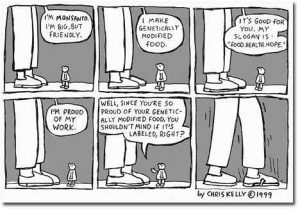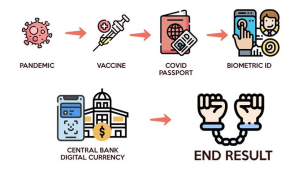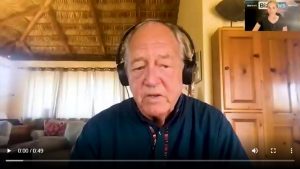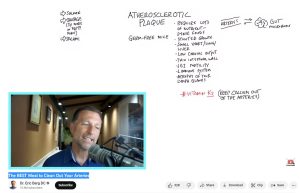
The BEST Meal to Clean Out Your Arteries
NWO Roadmap

Truth Bombs

Hedonism or Morality? Choose Wisely!
What’s happening? Why did so many major corporate brands decide to go all-in on promoting an aggressive, radical LGBT agenda that just a few years ago would have been considered totally unacceptable in civil society? Is this a psy-op? Is it real? What happens next?
The short answer to these questions is that we’ve entered a new phase of the culture war, and in some ways have transcended “the culture war” completely. What we’re in now is better described as a religious war — one that’s been launched by corporate America against all of us, and therefore demands we all choose sides.
Choosing sides in a religious war means you have to choose your religion. And in this particular religious war, there are only two sides. On one side is what C.S. Lewis called the Tao, which was his ecumenical shorthand for objective moral truth. “The Tao, which others may call Natural Law or Traditional Morality or the First Principles of Practical Reason or the First Platitudes, is not one among a series of possible systems of value,” Lewis wrote in The Abolition of Man. “It is the sole source of all value judgments. If it is rejected, all value is rejected. If any value is retained, it is retained.”
In America and in the West generally, the side of the Tao is the side of faithful Christians and Jews, as well as those atheists who, for practical reasons, cling to Judeo-Christian morality as the survivors of a shipwreck might cling to a lifeboat. It is the side that sees Target’s transing of kids as an intolerable moral evil, affirms the givenness of our nature and the created order, and recognizes not only that man isn’t God, but that man’s destiny is communion with God in a redeemed creation.
On the other side is what the writer Paul Kingsnorth, among others, has called the Machine, which at its root is a Nietzschean rebellion against God that turns out also to be “a rebellion against everything: roots, culture, community, families, biology itself.” Like the Tao, the religion of the Machine, of progress and technology and will to power, has a very long pedigree. It goes back to the Garden of Eden, where the serpent assured Eve, “You will not surely die,” that if she ate of the tree of the knowledge of good and evil, she would become like God.
That was the first rebellion; we have been reenacting it ever since. It is perhaps easier to see in our own time how every rebellion against God, from the Garden to now, is also an attempt to overthrow Him, to become like God. Indeed, the desire to play God is the dark heart of both transgenderism and its close cousin, transhumanism. Like other evils of our age — abortion and euthanasia, to name the obvious ones — these are, at their roots, extremely candid manifestations of pride, the source of all sin.
The Machine is a religion that makes a claim over and against reality and the created order, which are denied and disfigured in man’s attempt to arrogate the power to recreate himself according to his own desires. In our day, he seeks to do so using new technologies, but that he would desire to do so is merely the latest iteration of the rebellion that began in the Garden. This is what J.R.R. Tolkien meant when he said “all stories are ultimately about the fall.” Tolkien also referred to the Machine at times when discussing his legendarium, often describing it as the urge to amass power and dominate, “bulldozing the real world, or coercing other wills” — a tyranny exercised over creation with the object of overcoming mortality.
This is just what we see in the twin trans movements: a desire to overcome sex and a desire to overcome death. The transhumanists are as explicit about their desire to cheat death and attain godlike immortality as transgenders are about their desire to become the opposite sex. The latter appear to believe, like rebellious pagans of past ages, that children have an important role to play in the achievement of this desire. The Machine devoured children by fire on the altars of Moloch and Baal; it devours them now in the black mirrors of the internet and social media.
The temptation here is to dismiss this reading of our situation as hyperbole. Surely it isn’t as bad as all that, we want to say. But it really is. What’s happening now isn’t about corporate brands embracing “pride month,” as The New York Times recently framed it, or even about promoting tolerance in a diverse society. If Target were just selling T-shirts that said “fabulous” in rainbow letters no one would care. This is about transing kids. Everyone knows it, but no one wants to say so out loud. Corporations are the tip of the spear, pushing this stuff out and then letting the media turn around and accuse the right of being violent bigots for objecting.
We err, too, in thinking of all this as just a really bad case of “the culture war” that breaks along the familiar lines of left and right, blue and red. It’s partly that, but at its deepest level it’s a religious war, a spiritual struggle between light and darkness, good and evil, the Tao and the Machine.
All of which is to say that as this war develops, we should try not to get too caught up in how much Target stocks plummet or how low the price of Bud Light gets ($0, as of this writing). “Go woke, go broke” is — pardon the rhyme — a cope. That’s not to say we shouldn’t boycott these companies, even if it means financial hardship or inconvenience. Boycotting them is part of what we have to do in this religious war, but it’s not sufficient.
Corporate America is not going to stop, even if some corporations do go broke. What will be required of those who resist them is a deep religious commitment, a radical new way of living in the modern, digital age. If you’re a Jew, be deeply serious about your Judaism. If you’re a Christian, make the practice of your faith the central organizing fact of your life, not just something you do on Sundays. If you’re an atheist, pray that God gives you faith.
For adherents of the Tao, fighting this religious war is going to mean not just boycotting corporate brands but reorganizing your personal and professional life. It might mean quitting your job, or moving, or giving up certain things. It will require sacrifice. Perhaps great sacrifice.
And rest assured that every person in America is going to have to pick a side. If you don’t pick a side then your side will by default be that of the Machine, which dominates the heights of our post-Christian culture and economy. Whatever your opinion of transgenderism or identity politics, the Machine will suck you in and ensnare you unless you make a conscious choice to stand against it. So choose, and choose wisely. Your country — and, more importantly, your soul — depends on it.
Here’s what people are doing in Venezuela to get through hard times

What are the people around me doing differently?
I recently had the opportunity to talk with some country and small-town folks in Venezuela who I have known since childhood. Through our conversations, I could extract some valuable information on how they coped with the financial stress caused by the pandemic.
Producing our own food.
The first and most significant thing I learned was that these people produced an estimated 60% of their daily diet in their place. This means they grew their vegetables, raised livestock, and in general, were self-sufficient when it came to food. They did not have to rely heavily on grocery stores or restaurants to feed themselves and their families, which helped them save a lot of money.
Cutting expenses to the extreme.
The second thing I learned was that they cut expenses to extreme limits. They only spent money on the absolute necessities and saved the rest. Savings would be mostly for medical emergencies, indispensable car or machinery parts, spares, and such. This meant that they were always prepared for any unexpected expenses that might arise.
Having a productive environment.
The third thing I learned was that their places were already productive before the crisis hit, and some of them already with a solid network of clients to buy or trade their excess. This means they had established a strong local economy, where they could sell or trade their excess produce with others in the community. This not only helped them make some extra money but also ensured that they always had access to the things they needed, even when times were tough.
Having a productive place with a strong local economy is all about building community and supporting local businesses. This means buying from local farmers, artisans, and entrepreneurs and supporting local events and initiatives. I have yet to visit a cobbler that someone told me makes shoes and boots. This is interesting enough. Real Venezuelan leather surely lasts much longer than Far-East fabrics and rubber.
These three things – producing their food, cutting expenses to the extreme, and having a productive patch in a place with a strong local economy – were the key factors that helped these people cope with the financial stress caused by the pandemic. Let’s take a closer look at each of these factors and see how we can apply them to our own lives:
How To Prevent The Next Pandemic

Dr. Naomi Wolf Uncovers Pfizer’s Depopulation Agenda, as Evidenced by Its Own Documents

“This is a mystery novel in which the question is, how do we stop women from having healthy babies? That’s the story of the Pfizer documents.”
Pfizer KNEW 20-something different ways its shots sent women’s menstrual cycles into disarray. Pfizer ruined lives, knew it, and kept going anyway.
Q: What Has Pfizer Been Up To? A: Basically, Figuring Out How to Keep the Billions Rolling in

Pfizer has been acquiring pharma companies that focus on treating the problems caused by C Vax. Sources are all linked in the article.
Dr Patrick Moore

Greenpeace co-founder, Dr. Patrick Moore, on the catastrophic consequences of ‘Net Zero’:
“If we actually achieved Net Zero, at least 50% of the population would die of hunger and disease. [Because] at least 50% of the population depends on nitrogen fertiliser for its existence. And there’s people trying to ban it, and Netherlands and Sri Lanka have already made these kinds of moves. So it is truly a death wish in disguise, and the disguise is to save the Earth, which doesn’t need saving, particularly.”

